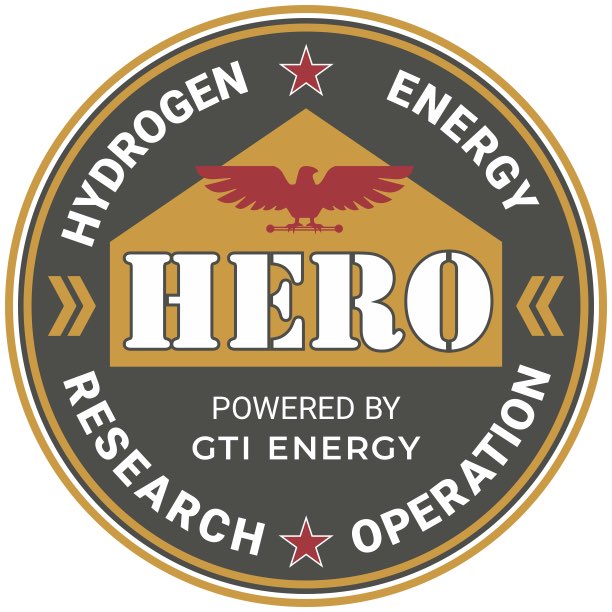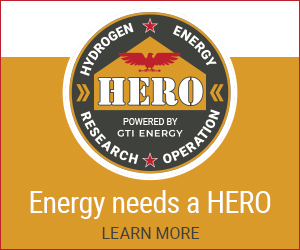
5 minute read
RISING HERO OF RESILIENCY
By GTI ENERGY
New Hydrogen Energy Research Operation (HERO) program demonstrates and deploys low-carbon technologies for efciency and reliability
Secure and reliable access to energy for Army installations is essential for our military to deploy, fight, and win in a complex world. Human-made and natural threats to electric power grids, natural gas pipelines, and water systems have the potential to jeopardize mission critical capabilities; disruption of utility services must be avoided at all costs.

Identifying and mitigating vulnerabilities is crucial to ensure resilient energy systems that directly impact military success, and the U.S. Army Corps of Engineers (USACE) Engineer Research and Development Center (ERDC) and its associated Construction Engineering Research Laboratory (CERL) and other facilities work to solve these important challenges.

CERL and GTI Energy: On a Mission to Reduce Energy Use and Improve Resiliency
CERL has contracted with GTI Energy to execute the HERO program aimed at increasing energy resiliency at military installations. GTI Energy, a leading technology development organization focused on scaling and deploying energy transition solutions, has more than 80 years of experience and a long-standing commitment to research and technology development for liquids, gasses, fuels, and infrastructure.
The organization has unparalleled experience and a long-standing commitment to hydrogen research and technology development, and is a recognized expert in hydrogen fuel cell technology, mobility, and distribution systems, positioning the organization as a perfect partner in the growing energy resiliency landscape.

As with many cutting-edge solutions, The U.S. Department of Defense (DoD) sets the pace, leading by example with broad application of energy-efficient technology. GTI Energy’s past and ongoing project activities with USACE, ERDC, CERL, and other DoD programs aim to assess a slate of technologies for their ability to cost-effectively reduce energy use and improve energy resiliency across the military. These multi-phase projects deliver higher efficiency cycles, improved controls, energy recovery, and other enhancements for onsite systems. From replacing equipment like water heaters and boiler pumps to developing new resilient hydrogen systems, demonstrations of emerging fuel-fired space and water heating technologies and secondary equipment to reduce loads are lowering lifecycle costs and reducing carbon emissions. GTI Energy consistently contributes successful results to the DoD, and this latest project is in step with that tradition.
Hydrogen Energy Research Operation (HERO)
The overall mission of HERO is to integrate state-of-the-art systems that span hydrogen production, delivery, storage, and end use at Army installations to provide secure and reliable access to energy while advancing decarbonization goals.
The aim is to demonstrate a viable framework for designing and deploying integrated hydrogen systems that can be replicated globally to ensure resiliency and continuity of essential infrastructure.
The program will leverage GTI Energy’s expansive experience and in-depth knowledge of hydrogen technologies such as fuel cells for both primary and back-up heat and power, as well as mobile applications including vehicles and forklifts, to evaluate their impact in reducing emissions. As the HERO program expands, the innovative integration of hydrogen will help prolong energy sources, lower costs, and help the Army maintain sustainable energy consumption for decades to come.
Multi-Phased Approach
The HERO program will be executed in phases, allowing for significant research and testing, along with establishing the foundation for safe operations, to ensure a high-quality integrated solution.
The first phase of HERO is dedicated to testing and evaluating equipment performance, generating a digital twin, and creating safety protocols over a two-year period. Technologies for producing, storing, distributing, and utilizing hydrogen will be validated at GTI Energy’s facilities in Des Plaines, Illinois, to enable turn-key integration.

An engineering design incorporating the digital twin will be created for an Army pilot facility installation. Researchers will develop a virtual reality (VR) training tool to provide personnel with the opportunity to gain expertise in the safe operation of hydrogen technologies prior to deployment on site.
Driven by the results, GTI Energy will prioritize hydrogen technologies that can be optimized and deployed based on mission needs. The integrated system will include various components for clean hydrogen generation, distribution for onsite hydrogen movement, resilient heat and power equipment, and technologies to support on-road/off-road vehicles and fueling facilities.

The Future of Energy Resiliency
Future phases of HERO will build on the results from the initial installation to expand hydrogen technologies solutions across a wider range of DoD facilities.
The success of hydrogen integration in military operations can help to position the Army as a leading example for the rest of the world as we transition to a low-carbon and resilient future.

The appearance of or reference to the U.S. Army Corps of Engineers, the U.S. Army, the U.S. Department of Defense, or the U.S. Government does not imply or indicate endorsement by any of these entities.










